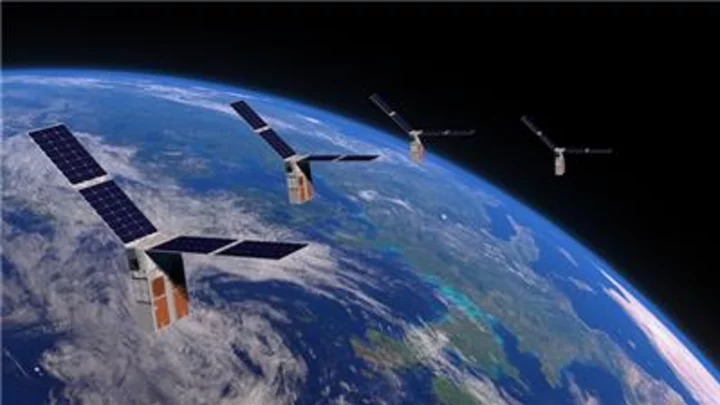LONG BEACH, Calif.--(BUSINESS WIRE)--Jun 22, 2023--
Rocket Lab USA, Inc. (Nasdaq: RKLB) (“Rocket Lab” or “the Company”), a global leader in launch services and space systems, today announced its next Electron mission will deploy seven satellites to space and include an attempt to recover the rocket’s booster after launch.
This press release features multimedia. View the full release here: https://www.businesswire.com/news/home/20230622914273/en/
NASA’s Starling mission will test new technologies for autonomous swarm navigation on four CubeSats in low-Earth orbit. Credits: Blue Canyon Technologies/NASA
The ‘Baby Come Back’ mission, Rocket Lab’s 39th Electron launch, is scheduled to deploy from Pad A at Rocket Lab Launch Complex 1 in Mahia, New Zealand during a launch window that opens July 14, 2023 UTC.
Rocket Lab is also planning to conduct a marine recovery of Electron’s first stage as part of this mission. Rocket Lab’s recovery team will retrieve Electron using a customized vessel and transport the stage back to Rocket Lab’s production complex for analysis. Data from this recovered stage will inform Rocket Lab’s ongoing recovery and reuse program.
The ‘Baby Come Back’ mission is a rideshare mission and will carry satellites for multiple customers.
“This mission demonstrates Rocket Lab’s ability to provide responsive space capabilities on accelerated timelines by making access to space possible for customers when they run into roadblocks,” said Rocket Lab Founder & CEO Peter Beck. “Electron is the world’s most reliable small launch vehicle and is demonstrating it can deliver customer’s payloads on their schedule.”
Payloads aboard the ‘Baby Come Back’ mission include:
NASA: NASA’s Starling mission is a four CubeSat mission designed to test technologies to enable future “swarm” missions. Spacecraft swarms refer to multiple spacecraft autonomously coordinating their activities to achieve certain goals. Starling will demonstrate technologies for in-space network communications, onboard relative navigation between spacecraft, autonomous maneuver planning and execution, and distributed science autonomy - an experiment for small spacecraft to autonomously react to observations, paving the way for future science missions.
Space Flight Laboratory (SFL): Space Flight Laboratory (SFL) selected Rocket Lab to launch Telesat’s LEO 3 demonstration satellite that will provide continuity for customer and ecosystem vendor testing campaigns following the decommissioning of Telesat’s Phase 1 LEO satellite.
Spire Global: Spire will launch two 3U satellites carrying Global Navigation Satellite System Radio Occultation (GNSS-RO) payloads to replenish its fully deployed constellation of more than 100 multipurpose satellites. Spire’s satellites observe the Earth in real time using radio frequency technology. The data acquired by Spire’s GNSS-RO payloads provide global weather intelligence that can be assimilated into weather models to improve the accuracy of forecasts. Spire is the largest producer of GNSS-RO weather data, collecting over 20,000 RO profiles a day.
+ About Rocket Lab
Founded in 2006, Rocket Lab is an end-to-end space company with an established track record of mission success. We deliver reliable launch services, satellite manufacture, spacecraft components, and on-orbit management solutions that make it faster, easier and more affordable to access space. Headquartered in Long Beach, California, Rocket Lab designs and manufactures the Electron small orbital launch vehicle, the Photon satellite platform and the Company is developing the large Neutron launch vehicle for constellation deployment. Since its first orbital launch in January 2018, Rocket Lab’s Electron launch vehicle has become the second most frequently launched U.S. rocket annually and has delivered 163 satellites to orbit for private and public sector organizations, enabling operations in national security, scientific research, space debris mitigation, Earth observation, climate monitoring, and communications. Rocket Lab’s Photon spacecraft platform has been selected to support NASA missions to the Moon and Mars, as well as the first private commercial mission to Venus. Rocket Lab has three launch pads at two launch sites, including two launch pads at a private orbital launch site located in New Zealand and a third launch pad in Virginia. To learn more, visit www.rocketlabusa.com.
+ FORWARD LOOKING STATEMENTS
This press release may contain certain “forward-looking statements” within the meaning of the Private Securities Litigation Reform Act of 1995, Section 27A of the Securities Act of 1933, as amended, and Section 21E of the Securities Exchange Act of 1934, as amended. These forward-looking statements are based on Rocket Lab’s current expectations and beliefs concerning future developments and their potential effects. These forward-looking statements involve a number of risks, uncertainties (many of which are beyond Rocket Lab’s control), or other assumptions that may cause actual results or performance to be materially different from those expressed or implied by these forward-looking statements. Many factors could cause actual future events to differ materially from the forward-looking statements in this press release, including risks related to our dependence on a limited number of customers; the harsh and unpredictable environment of space in which our products operate which could adversely affect our launch vehicle and spacecraft; increased congestion from the proliferation of low Earth orbit constellations which could materially increase the risk of potential collision with space debris or another spacecraft and limit or impair our launch flexibility and/or access to our own orbital slots; increased competition in our industry due in part to rapid technological development and decreasing costs; technological change in our industry which we may not be able to keep up with or which may render our services uncompetitive; average selling price trends; failure of our launch vehicles, spacecraft and components to operate as intended either due to our error in design in production or through no fault of our own; launch schedule disruptions; supply chain disruptions, product delays or failures; design and engineering flaws; launch failures; natural disasters and epidemics or pandemics, including the global COVID-19 pandemic; changes in governmental regulations including with respect to trade and export restrictions, or in the status of our regulatory approvals or applications; or other events that force us to cancel or reschedule launches, including customer contractual rescheduling and termination rights; risks that acquisitions may not be completed on the anticipated time frame or at all or do not achieve the anticipated benefits and results; and the other risks detailed from time to time in Rocket Lab’s filings with the Securities and Exchange Commission (the “SEC”), including under the heading “Risk Factors” in Rocket Lab’s Annual Report on Form 10-K for the fiscal year ended December 31, 2022, which was filed with the SEC on March 7, 2023, and elsewhere. There can be no assurance that the future developments affecting Rocket Lab will be those that we have anticipated. Except as required by law, Rocket Lab is not undertaking any obligation to update or revise any forward-looking statements whether as a result of new information, future events or otherwise.
View source version on businesswire.com:https://www.businesswire.com/news/home/20230622914273/en/
CONTACT: + Rocket Lab Media Contact
Mike Atchue
media@rocketlabusa.com
KEYWORD: CALIFORNIA UNITED STATES NORTH AMERICA
INDUSTRY KEYWORD: TECHNOLOGY AEROSPACE MANUFACTURING SATELLITE
SOURCE: Rocket Lab USA, Inc.
Copyright Business Wire 2023.
PUB: 06/22/2023 04:30 PM/DISC: 06/22/2023 04:30 PM
http://www.businesswire.com/news/home/20230622914273/en









